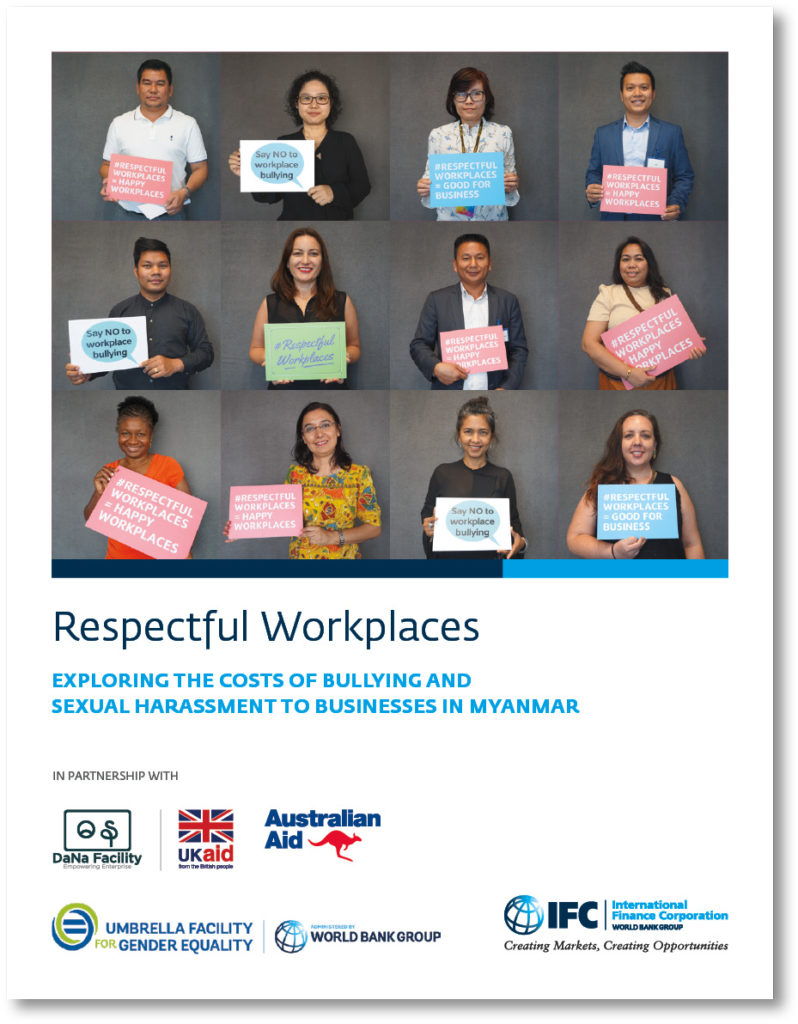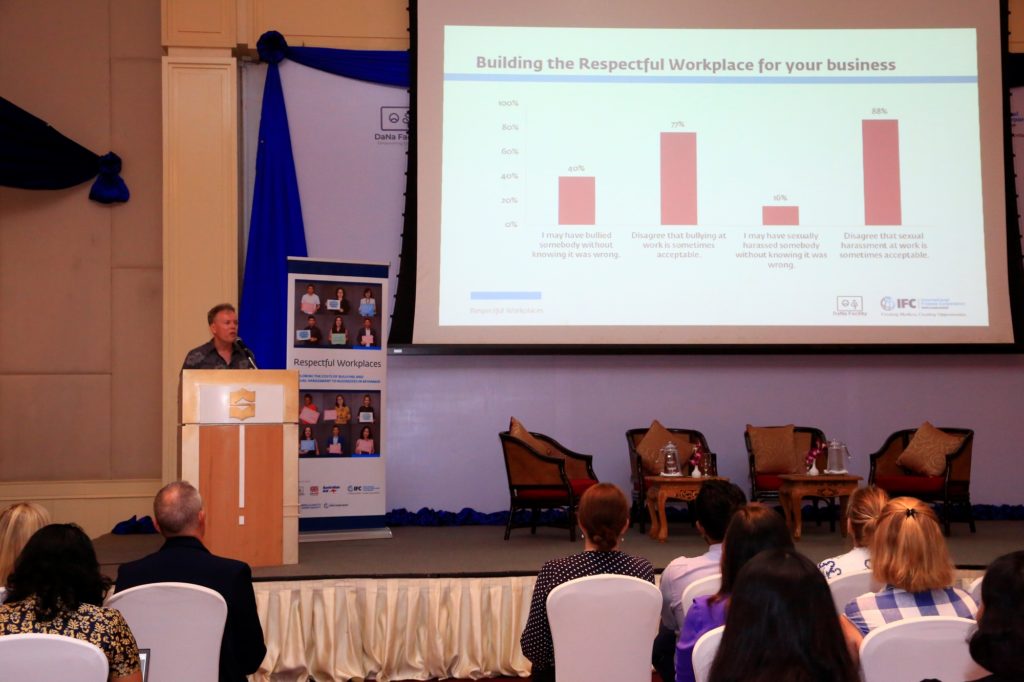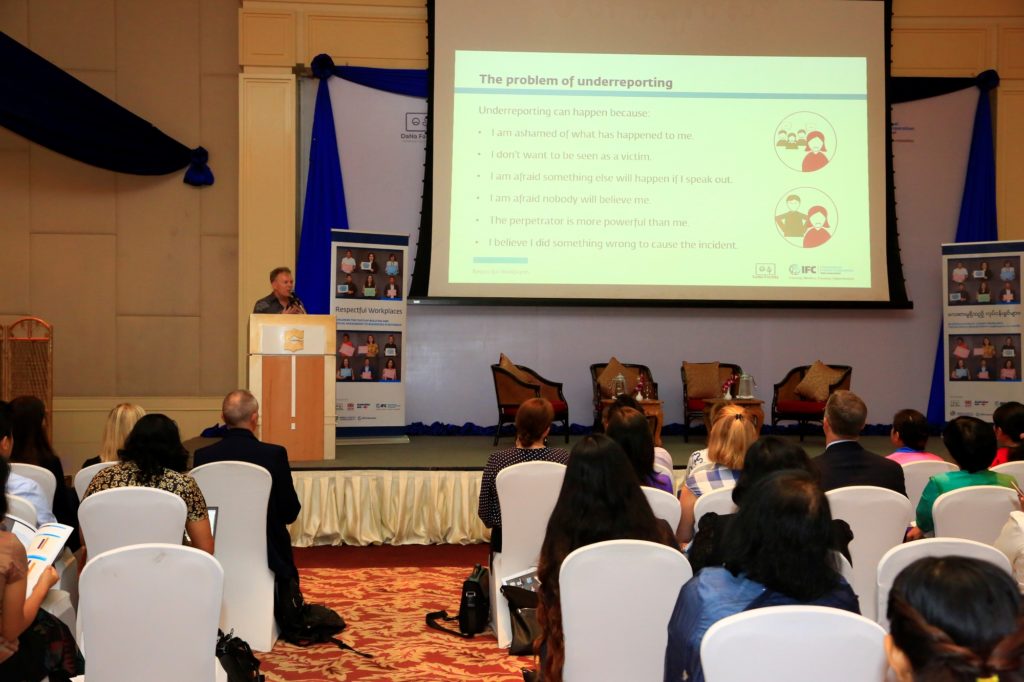Category: Tourism
Workplaces free from bullying and sexual harassment are good for business

Factive is pleased to announce the official launch of the report: Respectful Workplaces: Exploring the Costs of Bullying and Sexual Harassment to Businesses in Myanmar.
The study was carried out by the Factive team in Myanmar on behalf of International Finance Corporation (of the World Bank Group) and DaNa Facility between September and November in 2018 to understand the experiences of employees relating to bullying and sexual harassment in Myanmar workplaces. There were 39 participating organisations, including 26 large businesses in the agribusiness, finance, retail and tourism sectors.
Some of the key findings of the report:
- Sexual harassment affects all workplaces. 21 percent of employees said they had witnessed an incident of sexual harassment in their current workplace.
- Bullying is more common than sexual harassment. More than half of the employees said they had witnessed an incident of bullying.
- Bullying and sexual harassment are a significant cost to business. On average, the study found businesses experience a 14% loss to labor productivity due to presenteeism caused by bullying and sexual harassment.
- Businesses are not adequately prepared to respond. Very few businesses had formal policies and procedures in place. The vast majority of employees do not report incidents of sexual harassment and bullying. Instead, they ignore them or discuss them on social media.
- Bullying and sexual harassment are workplace culture issues that can be addressed. There were considerable differences in the levels of bullying and sexual harassment across the 26 large businesses. This contradicts the common excuse that these disrespectful behaviors are a natural part of Myanmar culture.
The report offers business leaders in Myanmar an opportunity to understand the experiences of employees relating to bullying and sexual harassment in their workplaces. It also provides a set of practical recommendations, targeting business leaders, human resource managers, employees and other interested parties, to help create workplaces that are safe and free from bullying and sexual harassment.
The report was produced by IFC’s Gender Secretariat in partnership with DaNa Facility. You can download a free copy of the report by visiting IFC’s website. Both Burmese and English versions are available.
A successful strategy for reducing workplace bullying?
Glenn D Rolfsen is a psychotherapist and leadership consultant who works in the corporate health service in Oslo. In this TEDx Talk he outlines a simple and effective strategy for reducing backbiting within a group or organisation.
If you are wondering what backbiting is, Rolfsen defines it as “talking negatively about a third person who isn’t present”. In other words, it’s gossip.
In many jurisdictions, government regulatory bodies exist with the ability to deal with workplace bulling complaints. In Australia, this is the Fair Work Commission. The commissioner, Danny Cloghan, is on record as saying that:
“Bullying can manifest itself in many ways. I consider it uncontroversial to say that spreading misinformation or ill-will against others is bullying […]. Scurrilous denigration of a worker in the workplace would certainly fall within the boundary of bullying.”
Employers have an obligation to address practices such as backbiting in their workplaces. In some cases, this is so they can comply with workplace regulations about providing a safe work environment. In all cases, it’s to ensure these kinds of behaviors do not negatively affect employee well-being, employee performance and overall business productivity.
Here, Rolfsen presents his 6-step strategy for reducing backbiting:
In his Tedx Talk, Rolfsen quotes a short aphorism attributed to Socrates, which, although possibly a miss-attribution, is nonetheless instructive.
In ancient Greece (469 – 399 BC), Socrates was widely lauded for his wisdom. One day an acquaintance ran up to him excitedly and said, “Socrates, do you know what I just heard about Diogenes?”
“Wait a moment,” Socrates replied, “Before you tell me I’d like you to pass a little test. It’s called the Triple Filter Test.”
‘Triple filter?” asked the acquaintance.
“That’s right,” Socrates continued, “Before you talk to me about Diogenes let’s take a moment to filter what you’re going to say. The first filter is Truth. Have you made absolutely sure that what you are about to tell me is true?”
“No,” the man said, “Actually I just heard about it.”
“All right,” said Socrates, “So you don’t really know if it’s true or not. Now let’s try the second filter, the filter of Goodness. Is what you are about to tell me about Diogenes something good?”
“No, on the contrary…”
“So,” Socrates continued, “You want to tell me something about Diogenes that may be bad, even though you’re not certain it’s true?”
The man shrugged, a little embarrassed.
Socrates continued, “You may still pass the test though, because there is a third filter, the filter of Usefulness. Is what you want to tell me about Diogenes going to be useful to me?”
“No, not really.”
“Well,” concluded Socrates, “If what you want to tell me is neither true nor good nor even useful, why tell it to me or anyone at all?”
https://www.speakingtree.in/blog/socrates-triple-filter-test
Seeking Myanmar Businesses to Participate in Research Project

The ‘Respectful Workplaces in Myanmar’ research project is getting underway soon. Data collection activities will run in September and October throughout Myanmar. Factive is undertaking this research for the International Finance Corporation and the DaNa Facility.
The research is targeting businesses across a number of sectors, including finance, retail, agribusiness and tourism. It aims to better understand how bullying and sexual harassment affect employees and business productivity.
Participating firms will have the opportunity to learn about the benefits and best practices of respectful workplaces through a free presentation in their workplace. The research team will also run a variety of activities in workplaces to collect data from employees. Activities include surveys, focus groups discussions and safety walks. The research will be used to inform future programs and initiatives to promote respectful workplaces in Myanmar.
Businesses operating in Myanmar are encouraged to get involved. The research is anonymous. The names of employees will not be recorded, and no information received from businesses will be shared with anyone outside the research team.
An information sheet for potential participants is available by clicking on this link: Respectful Workplaces Research Information Sheet.
Enquiries can be made through Factive’s website contact page.
Gender Research: Respectful Workplaces in Myanmar

New gender research project in Myanmar
Today Factive received the official notification of our engagement on a 6-month project to research sexual harassment and bullying in workplaces in Myanmar, working together with the IFC, the DaNa Facility and the Research Advisory Group. The research project is titled, “Respectful Workplaces in Myanmar.”
Factive’s lead consultant, Dean Laplonge, will be arriving in Yangon today to meet with the research advisory team and complete the recruitment of our national researchers for this project.
The gender research will be conducted using a mixed methods approach combining qualitative interviews and focus groups discussions with staff, company management, and relevant stakeholders, with workplace surveys. It will primarily focus on collecting data from four key sectors, plus some additional groups:
- Agribusiness
- Finance
- Retail
- Tourism
There is currently little data on the forms that sexual harassment and bullying take in Myanmar, or the prevalence, or the financial costs to companies and the national economy. Some work has been conducted by MCRB, ILO, CARE, Action Aid and YTC, particularly focused on the garments sector, but there is no data on the corporate and finance sectors, agribusiness, and tourism sectors. There is a need for a rigorous evidence base to inform corporate engagement on respectful workplaces and potential government legislative reform.
– IFC.
Additional notes
The DaNa Facility (DaNa is Burmese for “prosperity”) is a program funded by the U.K. Department for International Development. It works to reduce poverty and increase incomes by fostering a strong business environment conducive to the creation of jobs and economic opportunities for SMEs and poor people.
The International Finance Corporation (IFC) is an international financial institution that offers investment, advisory, and asset-management services to encourage private-sector development in developing countries. The IFC is a member of the World Bank Group and is headquartered in Washington, D.C..
Photo by Dudva.



